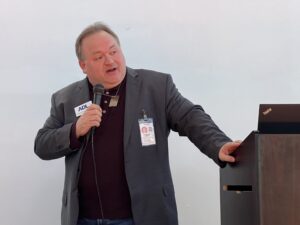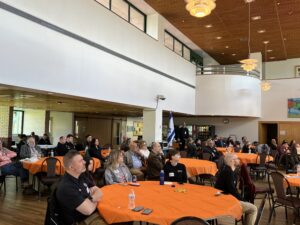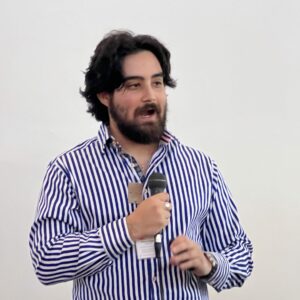When Andrew Goretsky was in college, he had a friend from a rural town in upstate New York who had never met a Jew before.
Goretsky said he was going home for Rosh Hashanah, and his friend asked him what that was. When Goretsky told him it was the Jewish New Year, “He looked at me dumbfounded and said, ‘You’re Jewish?’”
“He said, ‘You can’t be’…He looked at me deadpan and said, ‘Andrew, you don’t have horns.’”
“This was 1991. He was told the reason we wear hats and yarmulkes was we’re covering up our demon horns because we killed Jesus Christ,” said Goretsky, regional director of the Anti-Defamation League (ADL). Goretsky spoke at a seminar for teenagers and parents on dealing with antisemitism Sunday at Jack M. Barrack Hebrew Academy in Bryn Mawr.
According to Goretsky, there were more than 750 complaints of antisemitism filed with the ADL in this region, which also includes South Jersey, in 2023 alone. That’s up from about 500 in 2022. And since the Oct. 7 terrorist attack on Israel, antisemitic incidents have increased, especially at colleges and universities.

Andrew Goretsky
Jewish students are suing the University of Pennsylvania for antisemitism on campus. Its former president, Liz Magill, resigned due to her lackluster congressional testimony on the topic, as did Harvard’s president. Drexel and Temple face federal civil rights investigations over antisemitism. And in March, Haverford College students held an “Israel Apartheid Month.”
The two speakers at the Bryn Mawr event agreed that Jewish students should know their connection with Israel and be able to articulate what Israel means to them.
Dimas Guaico is the regional campus manager for the Jewish youth organization StandWithUs. Raised as a Christian to Latin American parents and a graduate of Bob Jones University in South Carolina, Guaico detailed Jewish history in Israel from biblical times on.
On May 14, 1948, the British pulled out, and the Jews declared a state.
“After 1,900 years of oppression, they finally have their Jewish state, Israel,” said Guaico. The next day, “five Arab armies invaded Israel for the sole purpose of destroying the newly created Jewish state,” he said. There were 750,000 Arab refugees and, at the same time, nearly one million Jewish refugees who were driven out of Arab countries and sought refuge in Israel. About 60 percent of Israelis are descendants of Jews from Arab countries, he said.
“It is a myth that Jews lived as equals with Arabs in the Middle East,” he said. Instead, they were “dhimmis,” or second-class citizens and slaves.
The Israelis turned Gaza over to the Palestinians in 2005. In 2006, the Palestinians elected Hamas as their government. Hamas’ charter calls for the destruction of Israel.
Goretsky said social media skews the conversations about the Hamas-Israel conflict.
“I want to encourage you to take the conversations off social media and engage in different ways…because the algorithms are really going to be giving you feedback of emotion,” he said.
“For those of you about to embark on college, you need to think about your own stories as it relates to Judaism, as it relates to Israel. How do you intend to share that?” Goretsky asked.
Many critics of Israel often have a double standard. For example, Israel isn’t the only country that receives U.S. foreign aid, but it’s the country being targeted for ire, he said.
“We’re not saying don’t be critical of Israel. We’re saying don’t be antisemitic,” said Goretsky.
Huntingdon Valley resident Ed Beck, president emeritus of Scholars for Peace in the Middle East, has a grandchild about to go to college and is concerned. Jewish institutions “need to provide more resistance training” because campus antisemitism “isn’t going to go away,” he said.
“A lot of my peers who don’t understand what’s going on with the conversation may be perpetuating harmful stereotypes or things that aren’t true are getting this information from TikTok or Instagram,” a teenage girl said and asked where to send them for accurate information.
Carl Nathan, a Jewish activist from Newtown Square, said people should know what the claims of pro-Palestinian protestors are so they can respond, and he recited a list.
Guaico referred both to the StandWithUs website.
“If people aren’t willing to have conversations, there is never going to be a road to peace. For us, education is the key to peace,” he said.
The seminar was hosted by the Jewish Federation of Greater Philadelphia.
Please follow DVJournal on social media: Twitter@DVJournal or Facebook.com/DelawareValleyJournal

